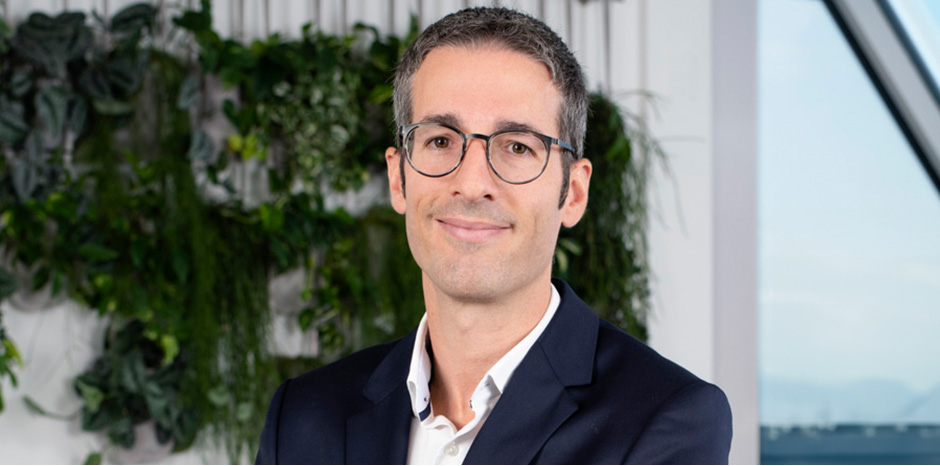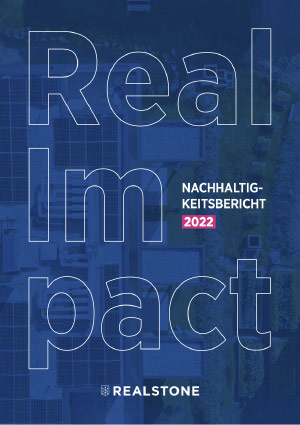Energetic refurbishment of real estate portfolio
"By investing in the energy transition, we are optimizing market value"

"Realstone follows its Real Impact philosophy of acting responsibly and sustainably by giving meaning to every action so that they have a real impact." Julian Reymond, CEO of Realstone SA.
The energy renovation of the Swiss real estate portfolio is a key challenge for achieving the decarbonization goals of the Swiss government. In this sense, Realstone SA, a fund management company with real estate assets of around 4.2 billion, has taken concrete measures to reduce its CO2 footprint and contribute to sustainable development. We had the opportunity to talk to Julian Reymond, CEO of Realstone, about the company's commitment to the energy transition and the measures taken to refurbish its real estate portfolio.
"Dive into the behind-the-scenes of Realstone Investment Foundation: how to go from a vacancy rate of 20% to almost 0% through active management?" Julien Bersier and Nada Andrié from Realstone SA give us a behind-the-scenes look at their active portfolio management using the example of the building at 5/5A-7/7A Rue de Mon-Repos in Fribourg.
How far along is the federal government on the path to climate neutrality, which is to be achieved by 2050?
On June 18, 2023, Switzerland adopted the Climate, Innovation and Energy Security Act. This decision represents a significant step towards the transition to climate neutrality. The cantons now play a crucial role in determining the means to achieve these goals, particularly with regard to incentives for building renovation in the real estate sector.
What influence does the real estate sector have on the energy transition?
The real estate sector plays an important role in this transition due to its high share of Switzerland's greenhouse gas emissions (25.8% of Switzerland's total emissions). To achieve climate neutrality by 2050, it is crucial that we renovate our building stock to make it more energy efficient and continue to build energy-efficient new buildings.
Has the real estate industry recognized its role in the energy transition?
Areas heated with fossil fuels account for 62.8% of the residential real estate stock in Switzerland. Currently, the renovation rate in Switzerland is less than 1%, far below the targets set by the federal government. If we continue to renovate at this rate, it will take us more than 60 years to reach our CO2 -neutral target. To meet the federal ambitions, we would need to at least double or even triple our current renovation pace immediately. For this reason, it is very important that incentives are created that motivate property owners to invest more and faster.
What measures is Realstone taking in the area of sustainable development and energy renovation?
Realstone has implemented several pragmatic measures to reduce the CO2 footprint of the properties we manage. We continue to invest in the renovation of our property portfolio by renewing the thermal envelope and replacing heating systems. Through the continuation of energy optimization contracts, we continue to improve the energy efficiency of our boiler rooms to save up to 16% of the energy consumed. In addition, we continue to increase our production of renewable energy by installing rooftop photovoltaic systems. We are also conducting a survey among our tenants to understand their expectations and improve our services. Based on these results, we have developed an action plan for our tenants that includes initiatives such as installing charging stations for electric vehicles, using environmentally friendly cleaning products, and strengthening our tele processes to record energy consumption.
"Sustainability has been part of Realstone's DNA since its inception."
Julian Reymond, Realstone SA
How does Realstone contribute to the Sustainable Development Goals?
Realstone follows its Real Impact philosophy of acting responsibly and sustainably by giving meaning to every action so that they have a real impact. This is reflected in the implementation of concrete actions aligned with the four strategic axes of our responsibility EESG (Economic, Environmental, Social and Governance). These include an action plan with 10-year targets and annual monitoring in our sustainability report. Sustainability has been part of Realstone's DNA since its inception. It was formalized by joining the United Nations Global Compact (UNGC) before being monitored and assessed through participation in the global ESG benchmark for real estate assets launched by GRESB.
How does Realstone lower costs for tenants while promoting energy efficiency?
Our approach to energy efficiency also helps reduce costs for tenants. We invest in energy-efficient equipment such as LED lamps and water savers. By replacing fossil fuel-fired boiler rooms with heat pumps or district heating, we reduce our CO2 emissions and our vulnerability to CO2 taxes. In addition, our photovoltaic systems allow us to provide clean and local electricity to our tenants at a preferential price. These measures help reduce utility costs and create sustainable eco-housing.
What is Realstone's long-term vision for the energy transition?
Realstone sees investments in the energy transition as an integral part of its EESG strategy. We plan to make long-term investments in the replacement of heating systems, the renovation of the thermal envelope and the installation of photovoltaic systems. These investments optimize the market value of our real estate portfolio in the long term while helping to reduce our CO2 footprint. We follow a rigorous planning of these works to smooth their amortization over the coming years and maintain stable dividends for our investors.
Realstone Sustainability Report

Learn more about the 2022 Sustainability Report and dive into the heart of Realstone's Real Impact philosophy.
For more information on the performance of the Realstone investment group, please visit our download center.
Your contact

Christoph Beck
Senior Client Advisor Market Switzerland
+
This content is for information purposes only and should not be construed as an investment recommendation, investment advice or the result of any financial analysis, nor should it be construed as an offer or invitation to submit an offer. The "Guidelines for Ensuring the Independence of Financial Research" of the Swiss Bankers Association do not apply to this publication. This document does not constitute a simplified prospectus pursuant to Art. 5 CISA, an offering prospectus pursuant to Art. 652a or Art. 1156 CO or a listing notice within the meaning of the Listing Rules. Therefore, only the simplified prospectus drawn up by the issuer is authoritative, together with all additional product information of the issuer. The simplified prospectus and the additional product information of the issuer as well as the brochure "Special Risks in Securities Trading" may be obtained free of charge at any time from Picard Angst AG, CH-8808 Pfäffikon SZ (Tel. +41 (0)55 290 55 55* or e-mail info@picardangst.com).
From a legal point of view, structured products are debt securities (receivables), so that the default risk depends on the creditworthiness of the issuer. In this respect, the investor bears the risk of a deterioration in the creditworthiness or insolvency of the issuer, which can lead to a partial or total loss of the invested capital.
For a detailed description of all material risks (issuer risk, market risk, currency risk, liquidity risk, product-specific risks, etc.), please refer explicitly to the simplified prospectus of the issuer, together with all additional product information of the issuer. The information contained herein does not replace the qualified advice absolutely necessary prior to any purchase or investment decision, in particular with regard to all associated risks and the suitability of this product.
This publication and the financial product depicted therein are not intended for persons subject to a jurisdiction that restricts or prohibits the distribution of this financial product or of this publication or the information contained therein.
Performance achieved in the past must never be understood as an indication or guarantee of future performance. All information is provided without guarantee.
Calls to the number marked with (*) may be recorded. If you call this number, we assume that you agree to this business practice.